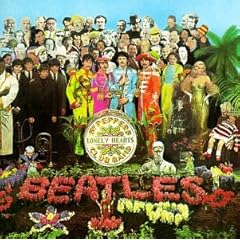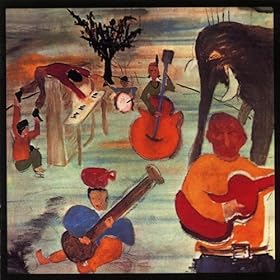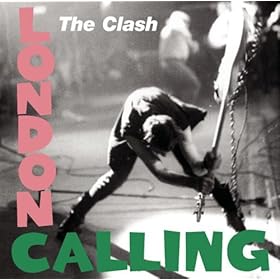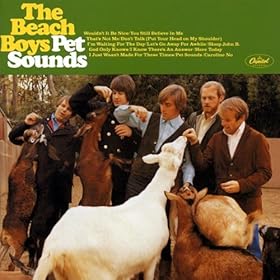Now, my very very first post introduces everything, but a bit of thinking has led me to some interesting things:
1. I think it would be awesome if I eventually could teach a History of Rock and Roll class. Like at any University. Like, you know, MUS 252 at OSU. That would be cool.
2. I can already expect that I would do better than whatever scrub is teaching it right now.
3. But here's the rub, and where we get to my Mission Statement: with regards to "rock and roll" as we know it, the ALBUM is the highest form of music. There is nothing better. No A-side/B-side can ever conquer the sheer artistic perfection that an album can.
So here, let me restate that. The Mission Statement of Gumption Centers:
"
Rock and roll music is an esteemed form of popular music and, on the whole, music. In this genre, the masterwork comes in the form of the album. There is no greater joy to the ears than putting on the perfect LP, to be taken away to a different realm of existence for the duration of that LP. The LP, the record is the barometer with which all albums and any so-styled rock and roll artist should be measured. Any rock and roll artist who does not take the album seriously should therefore not be taken seriously.
"
The album is the greatest chance any artist has to make a real statement. While albums inherently haven't always been treated as total and coherent works (see: the Beatles' Please Please Me, With the Beatles, Beatles For Sale, Help!), it is still of paramount importance that the album projects a clear, coherent image of the group - how else do albums like the Beatles, Exile On Main St. hold up in all their splendor? The Beatles is a severely fractured record, with Lennon's searing confessionals, McCartney's dalliances with music hall styles, Harrison's increasingly successful forays into spirituality, and Ringo's general playfulness, so how can it hold up? Well, it's because the Beatles simply provided a coherent sound and existence as the group, no matter how far they were drifting at the time. It all sounded like the Beatles, and it all was good.
And so we come to this...what makes a good album? Heretofore, I list my criteria:
1. The album must be largely void of weak tracks. One exceedingly weak track severely hurts the album as an entire form. There is no forgiveness for a weak track, but there is always forgiveness if there is no "#1 World Single For The Next 50 Years" on the record.
2. The album must present a cohesive view of what the artist is trying to achieve.
3. The album must maintain proper flow. The artist should be mindful that in playing a record the entire way through that they do not want to put the listener to sleep with seven straight slow tracks nor pound the listener's head in with seven ear-bleeders (usually excepted in this instance: punk). But it is also of great importance that tracks flow into one another, with a minimal use of "reset buttons" to suddenly adjust the flow of a record (and excepted in this instance: switching sides on an LP or switching an LP).
Those are really the three criteria. It doesn't seem like a lot, but it actually is. And if it seems exceedingly harsh, I'd like to think that it is because that I take the album as an art form very seriously. Heretofore I will go through what I consider the top five records of all time and grade them based on my criteria (I am using my list from my very very first entry, which I still find correct):
 1. Bob Dylan - Highway 61 Revisited
1. Bob Dylan - Highway 61 RevisitedWeak tracks? Absolutely not. From "Like A Rolling Stone" through "Desolation Row," Bob Dylan is at the tiptop of his game. Every track is utterly visceral and totally gripping, as Dylan weaves words, stories, myths and dreams around the listener about such fantastical characters as Cinderella and Casanova in "Desolation Row" to Sweet Melinda in "Just Like Tom Thumb's Blues." And as a bonus, there is the "#1 World Single For The Next 50 Years" so coveted by everyone, and its name is "Like A Rolling Stone." Is the album cohesive, in that it presents a unified view of the artist? Yes. Dylan is at his most obtuse here, but that doesn't mean whatever hazy view lyrically is supported by some hazy combination of instrumentation. The backing band here is on fire, providing Dylan a perfect and consistent backdrop with which to paint on. Listening to this record, you realize that Dylan paints in a similar fashion with each song, which ensures cohesion in the record. Proper flow? Check. Every track seamlessly flows into one another, with the proper amount of pacing from the open to the close. Done. No need to explain any more. IF you think I do, you have head issues. Not to offend, but seriously. This record is perfect in every way.

2. The Beatles - Sgt. Pepper's Lonely Hearts Club Band
You really can't write anything original about this record because it's already been said. It's an immaculately crafted concept album, thus satisfying every criterion. Next.

3. The Band - Music From Big Pink
No, no weak tracks here. Super-hit (and therefore maligned for its pervasive appearance in popular culture) with "The Weight." "Chest Fever" grooves just as good as James Brown, while the ballads like "In A Station" and "Lonesome Suzie" are impeccably powered along by Richard Manuel's angelic singing. This record is cohesive in that it essentially is representing America and its rural and core values (see my previous entry on the Band, titled It Must Be the Beards: "America" and "Common Sense" in Rock Music). And it flows lazily from one track to another, never hurrying but never lulling the listener into stupor with impeccably timed more upbeat tracks, but since the Band's sound and vision is so united, the flow is never "off" ever during the record.

4. The Clash - London Calling
Weak tracks? No, you can't really say that there are any exceedingly weak tracks. While "Koka Kola" isn't exactly "Rudie Can't Fail" or "London Calling," it's certainly not chaff, because it's an essential pastiche that plays an integral role in the record. You also have the major hit factor with both "Train In Vain (Stand By Me)" and "London Calling," so there's that criterion checked off. A cohesive view? I would argue that. It seems stylistically all over the place. There's heavy reggae influences in "Guns of Brixton" to the roar of the blues rip-off "Brand New Cadillac" to the light bar jazz of "Jimmy Jazz" (I swear that wasn't intentional). But the cohesive view? Punk has no boundaries. Punk is an aesthetic unbounded by genre and style and sound. The claim is that punk is capable of everything. And I think they accomplished it. The flow is certainly there, with enough energy to instill fear into the hearts of the ignorant and enough "downtime" (though I wouldn't really call it such) to allow for recharging before taking up the crusade once again.

5. The Beach Boys - Pet Sounds
This is also one of those records that is almost impossible to write about now. Flawless, stunning, and perfect in every way, it is an encapsulation of the innocence of youth, growing up (but sincerely not really wanting to), and the fond reminiscence of those youthful days where all that mattered was "you" and "me."
So there you go. There are countless albums that can be considered pretty perfect, but these five stand tall, heads and shoulders above the rest. Always and forever. It is highly unlikely that any record from here on out will conjure up the same effects on listeners that those five records have had on the rock and roll soundscape. For better or for worse, those records cast a shadow on everything else that has ever been and will ever be released.




No comments:
Post a Comment